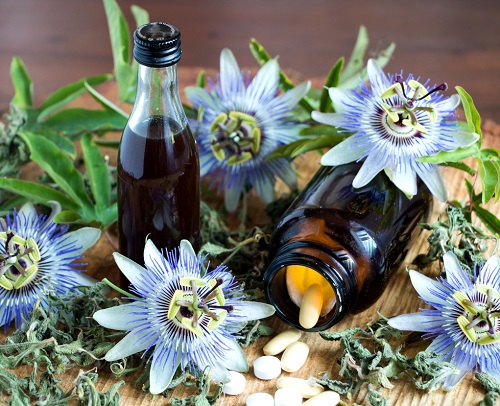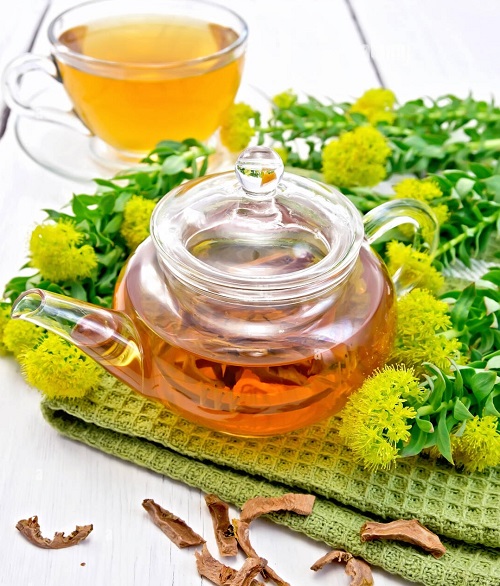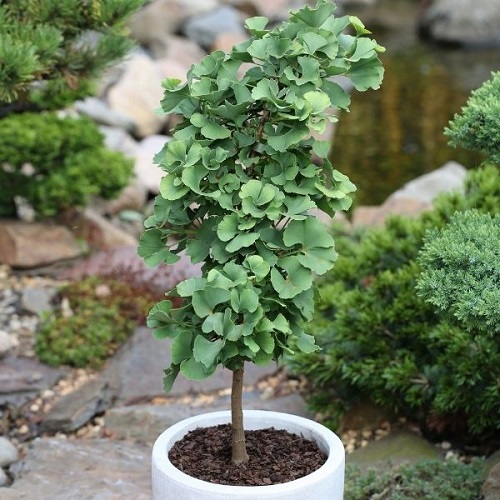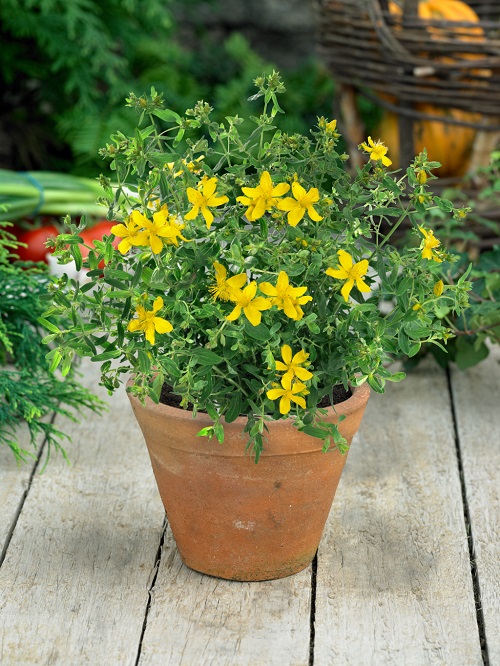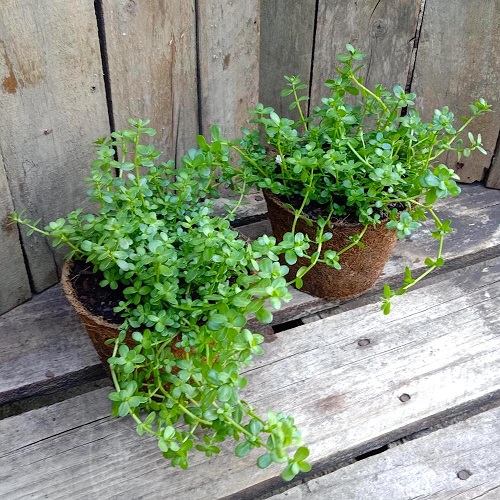These Best Medicinal Herbs can help you in a lot of ways in day to day activities. Check out our exclusive list below!
Herbs for anxiety are a fantastic way to soothe your mind and find calmness without resorting to pharmaceutical options. Let’s explore some of the Best Medicinal Herbs that can help alleviate anxiety and their uses.
Check out the best vining herbs here
Best Medicinal Herbs
In today’s fast-paced world, anxiety has become a common struggle for many. The pressures of modern life can often leave us feeling overwhelmed and stressed. While seeking professional help is essential for severe cases, Medicinal Herbs can also provide relief.
1. Lavender
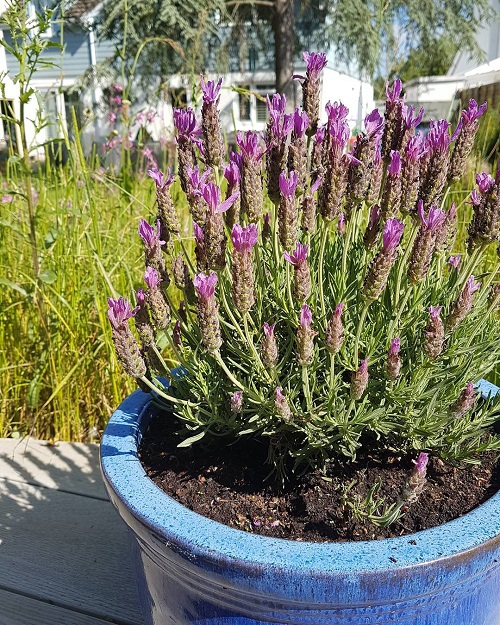
Botanical Name: Lavandula angustifolia
Lavender, with its delightful fragrance, is popular for its calming effects on both the mind and body. It’s famous for aromatherapy to reduce stress and anxiety.
The scent of lavender has a direct impact on the brain, promoting relaxation and mood.
Compounds and Mechanism: Lavender contains linalool and linalyl acetate, which are terpenes that interact with gamma-aminobutyric acid (GABA) receptors in the brain. GABA is an inhibitory neurotransmitter that helps regulate anxiety. Lavender’s aroma promotes a sedative effect by enhancing GABA’s calming effects.
How to Use: You can use these Medicinal Herbs in various forms, such as essential oil, dry flowers for teas or sachets, and even as a decorative plant in your home. Inhaling the aroma of lavender oil or sipping lavender tea can help induce a sense of calmness.
Growing Tips:
Lavender thrives in well-draining soil and full sunlight. Make sure to prune the plant regularly to encourage new growth and maintain its shape.
2. Chamomile
Botanical Name: Matricaria chamomilla
Chamomile is a gentle herb that’s popular for its soothing properties for centuries. It’s common as tea to promote relaxation and better sleep.
Chamomile contains compounds that bind to receptors in the brain, reducing anxiety and inducing a sense of calmness.
Compounds and Mechanism: Chamomile contains apigenin, an antioxidant that binds to benzodiazepine receptors in the brain, which are involved in anxiety regulation. This interaction helps promote relaxation and alleviate stress.
How to Use: Chamomile tea is the most popular way to enjoy its benefits. Steep dried chamomile flowers in hot water for a few minutes and enjoy them before bedtime for a peaceful night’s sleep.
Growing Tips:
Chamomile prefers a sunny spot in your garden and soil that remains consistently moist. Regularly harvesting the flowers not only provides you with soothing tea but also encourages continuous blooming.
3. Lemon Balm
Botanical Name: Melissa officinalis
Lemon balm is popular for its lemony scent and calming effects. It enhances mood and alleviates nervousness. These Medicinal Herbs contain compounds that interact with GABA receptors in the brain, which play a role in reducing anxiety.
Compounds and Mechanism: Lemon balm contains rosmarinic acid and polyphenols that inhibit the enzyme GABA transaminase, allowing GABA to stay active in the brain for longer. This leads to reduced anxiety and enhanced relaxation.
How to Use: Lemon balm can be used in teas, tinctures, or as a flavoring in culinary dishes. Drinking lemon balm tea or incorporating it into your meals can help soothe anxiety.
Growing Tips:
Lemon balm thrives in well-draining soil and can tolerate partial shade. Regularly pruning the plant keeps it from becoming too leggy and encourages new growth.
4. Passionflower
Botanical Name: Passiflora incarnata
Passionflower has a long history of use as a natural remedy for anxiety and insomnia. It contains compounds that boost the levels of GABA, a neurotransmitter that helps calm the brain and promote relaxation.
Compounds and Mechanism: Passionflower contains flavonoids like chrysin that bind to GABA receptors, increasing the availability of GABA in the brain. This leads to decreased anxiety and enhanced tranquility.
How to Use: Passionflower can be consumed as a tea, tincture, or supplement. Drinking passionflower tea before bedtime can help ease anxiety and improve sleep quality.
Growing Tips:
Passionflower vines require sturdy support as they grow. Provide well-draining soil and a sunny to partially shaded location for optimal growth.
5. Valerian

Botanical Name: Valeriana officinalis
Valerian is known for its sedative properties and is often used to alleviate insomnia and anxiety. It works by increasing GABA levels in the brain.
Compounds and Mechanism: These Medicinal Herbs contain valerenic acid and valeranon, which interact with GABA receptors in the brain, leading to increased GABA activity. This results in reduced anxiety and improved relaxation.
How to Use: You can consume it in the form of capsules, tinctures, or teas. Having valerian tea before bedtime can help promote relaxation and improve sleep.
Growing Tips:
Valerian thrives in rich, moist soil and prefers full sun to partial shade. The root is typically popular for its medicinal properties.
Growing Herbs Indoors? Here are 46 Best Indoor Herb Garden Tips To Know Today
6. Ashwagandha
Botanical Name: Withania somnifera
Ashwagandha, also famous as Indian ginseng, is an adaptogenic herb popular for its ability to help the body adapt to stress. People also use it to reduce anxiety and promote overall well-being.
Compounds and Mechanism: Ashwagandha contains a bioactive compound – withanolides, which modulates the levels of neurotransmitters like GABA, serotonin, and dopamine. These compounds contribute to its anxiolytic (anxiety-reducing) effects.
How to Use: You can take it in the form of capsules, powders, or teas.
Growing Tips:
Ashwagandha is a perennial herb that thrives in well-draining soil and full sunlight. It’s a robust plant that can grow in various soil types.
7. Rhodiola
Botanical Name: Rhodiola rosea
Rhodiola is another adaptogenic herb that enhances resilience to stress and anxiety. It’s popular for its energy-boosting and mood-enhancing properties.
Compounds and Mechanism: Rhodiola contains compounds like rosavins and salidroside, which modulate stress pathways in the body. They help regulate stress hormones and support a balanced mood.
How to Use: These Medicinal Herbs are available in various forms, including capsules and extracts. It’s often taken as a supplement to improve mental and physical resilience.
Growing Tips:
Rhodiola is a hardy plant that prefers well-draining soil and partial sunlight. It’s well-suited for cooler climates and high altitudes.
8. Holy Basil
Botanical Name: Ocimum sanctum
Holy Basil, also popular as Tulsi, is a sacred herb in Ayurvedic medicine. It’s popular for its adaptogenic properties and its ability to promote relaxation.
Compounds and Mechanism: Holy Basil contains compounds like eugenol and ursolic acid, which have antioxidant and anti-inflammatory effects. These compounds contribute to its stress-relieving and anxiolytic properties.
How to Use: Holy Basil leaves are great as tea. You can also add them to dishes for their aromatic flavor. Holy Basil supplements are also available for convenience.
Growing Tips:
Holy Basil is easy to grow and can thrive in both pots and gardens. It prefers well-draining soil and sunlight.
9. Ginkgo Biloba
Botanical Name: Ginkgo biloba
Ginkgo Biloba is a popular herbal remedy with cognitive-enhancing and mood-stabilizing effects.
Compounds and Mechanism: These Medicinal Herbs contain flavonoids and terpenoids that have antioxidant and neuroprotective properties. These compounds may help improve blood flow to the brain and regulate neurotransmitter levels.
How to Use: Ginkgo Biloba supplements famous to support cognitive function and mood stability.
Growing Tips:
Ginkgo Biloba is a tree that requires a spacious outdoor environment. It’s not suitable for indoor cultivation.
10. St. John’s Wort
Botanical Name: Hypericum perforatum
St. John’s Wort is a famous herbal remedy for alleviating mild to moderate depression and anxiety.
Compounds and Mechanism: St. John’s Wort contains hypericin and hyperforin, which contributes to its antidepressant and anxiolytic effects. These compounds may modulate neurotransmitter levels, including serotonin, dopamine, and norepinephrine, which play a crucial role in mood regulation.
How to Use: St. John’s Wort is available in various forms, including capsules, tablets, and teas. It’s common as a natural remedy for improving mood and reducing anxiety.
Growing Tips:
St. John’s Wort is a perennial plant that prefers well-draining soil and full sunlight. It can grow in various climates and is often cultivated in home gardens.
Want to start experimenting? Here are the Best Companion Herbs You Can Grow Side by Side
11. Brahmi
Botanical Name: Bacopa monnieri
Brahmi, also known as Water Hyssop, is a traditional Ayurvedic herb valued for its cognitive-enhancing properties and potential to alleviate anxiety.
Compounds and Mechanism: Brahmi contains active compounds called bacosides, which have been found to have neuroprotective effects. These compounds may enhance neurotransmitter function and promote a sense of calmness.
How to Use: These Medicinal Herbs are often consumed in the form of capsules, powders, or extracts. It’s commonly used as a cognitive enhancer and stress-relieving herb.
Growing Tips:
Brahmi is a water-loving herb that thrives in moist or aquatic environments. It can be grown in pots with a water tray or directly in water gardens.
How to Use These Herbs
Incorporating fresh herbs into your daily routine can be a delightful and effective way to harness their anxiety-relieving benefits. Here’s how you can make the most of these herbs when they’re grown in your own garden or pots:
1. Lavender: Harvest the fragrant lavender flowers and use them to make calming herbal teas. You can also place fresh lavender in sachets and keep them near your pillow to enhance relaxation during sleep.
2. Chamomile: Gently pluck chamomile flowers and infuse them in hot water for a soothing tea. Enjoy a cup before bedtime to promote relaxation and restful sleep.
3. Lemon Balm: Fresh lemon balm leaves can be steeped in hot water to create a calming tea. You can also add fresh lemon balm leaves to salads or use them as a garnish for various dishes.
4. Passionflower: Harvest fresh passionflower leaves and flowers to make a homemade passionflower tea. Fresh leaves can also be used as an ingredient in salads or added to beverages.
5. Valerian: Fresh valerian roots can be used to make a calming tea. Wash and chop the roots before steeping them in hot water. Valerian tea is best consumed in the evening to aid relaxation.
6. Ashwagandha: Fresh ashwagandha roots can be dried and ground into a powder. This powder can be added to warm milk or smoothies for a calming and fortifying drink.
7. Rhodiola: While fresh rhodiola roots are bitter, you can chop them finely and add a small amount to smoothies for an energizing boost. Keep in mind that the bitter taste may be strong.
8. Holy Basil: Fresh holy basil leaves can be used to make a rejuvenating tea. Simply steep the leaves in hot water for a few minutes and enjoy its stress-relieving benefits.
9. Ginkgo Biloba: Ginkgo Biloba leaves can be dried and ground into a powder. This powder can be added to foods or beverages to support cognitive health and reduce stress.
10. St. John’s Wort: Fresh St. John’s Wort flowers and leaves can be infused in oil to create a soothing massage oil. The oil can be applied topically to promote relaxation and ease tension.
11. Brahmi: Fresh Brahmi leaves can be consumed as a salad green or blended into smoothies. The leaves have a mild taste and can contribute to cognitive well-being.
Essential Container Herb Garden Tips: Growing Herbs In Pots
Using fresh herbs allows you to experience their natural aroma, flavor, and therapeutic properties at their peak. Whether enjoyed in teas, salads, or culinary creations, incorporating these herbs into your diet can complement their anxiety-relieving effects while also adding a touch of freshness to your meals and beverages.
Incorporating these herbs into your wellness routine can provide additional options for managing anxiety. As with any herbal remedy, it’s important to consult with a healthcare professional before making significant changes to your routine, especially if you’re already taking medications or have underlying health conditions.
Frequently Asked Questions (FAQs) About Herbs for Anxiety
1. Can I grow these herbs in pots?
Yes. Here’s a quick overview of which herbs are suitable for pot cultivation:
- Lavender: It’s important to provide excellent drainage and ample sunlight.
- Chamomile: Chamomile is good for pots, and its delicate flowers add a lovely touch to your balcony or garden.
- Lemon Balm: Lemon balm is a great choice for pots, as it can be invasive in the ground. Regular pruning helps control its growth.
- Passionflower: Compact or trailing passionflower varieties are good for pots. Choose a larger pot to accommodate its root system.
- Valerian: Keep in mind that it can become quite large. Choose a sizable container to allow its root system to spread.
- Ashwagandha: Ashwagandha is good for pots, making it easier to manage its growth and harvest the roots.
- Rhodiola: Rhodiola can be challenging to grow in pots due to its deep root system. It’s best for larger outdoor spaces.
- Holy Basil: Holy Basil can thrive in pots, especially in climates with colder winters, as you can bring the pot indoors.
- Ginkgo Biloba: Ginkgo Biloba is a tree and requires significant space, making it unsuitable for most pots.
- St. John’s Wort: It’s important to choose a larger container to accommodate its growth.
2. Are these herbs safe to use alongside medications?
While these herbs are generally safe, it’s crucial to consult with a healthcare professional before using them, especially if you’re taking medications or have underlying health conditions. Some herbs may interact with medications or have contraindications, so professional guidance is essential.
3. Can these herbs be used in combination?
In some cases, these herbs can be used together, but it’s recommended to consult with a healthcare professional before combining different herbs. Their effects may overlap or interact, and a healthcare provider can help ensure safe and effective use.
Short on space? Here is How to Make a Balcony Herb Garden
4. How long does it take to experience the benefits of these herbs?
The timeline for experiencing the benefits of these herbs can vary. Some people may notice improvements within a few weeks, while others may take longer. Consistent use and individual response play a role in how quickly the herbs’ effects become noticeable.
5. Are there any side effects associated with these herbs?
Side effects are possible with any herbal remedy. While these herbs are generally safe, they can cause adverse reactions in some individuals. Common side effects might include gastrointestinal discomfort or allergic reactions. It’s important to start with a low dose and monitor your body’s response. If you experience any adverse effects, discontinue use and consult a healthcare professional.



